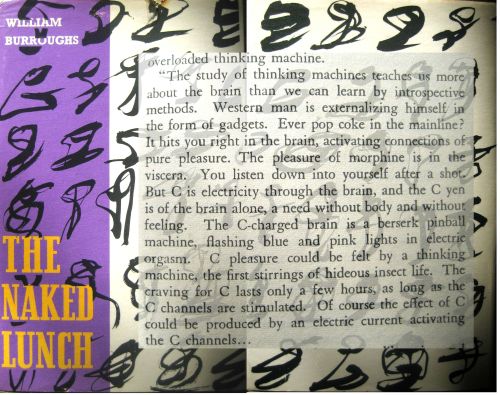Alport’s science fiction
When Hugo Gernsback coined the term ‘science fiction’ in 1929, he defined it simply as ‘a charming romance intermingled with scientific fact and prophetic vision’. Fascinating may be a better word than charming for some of the science fiction in the Alport Collection. The examples of the genre that Erich Alport bought and read span the best part of the century and demonstrate that the genre has been used not only to write about ‘scientific fact and prophetic vision’ but also to make social commentary and explore the human condition in unusual circumstances.
The Invisible Man
You are the only man…who knows there is such a thing as an Invisible Man… Help me – and I will do great things for you. An Invisible Man is a man of power. – Griffin (The Invisible Man : a grotesque romance, H.G. Wells, 1897)
Alport probably bought his first edition of The Invisible Man whilst he was in Oxford for ten shillings and six pence. It still bears the signature of its original owner, the sociable Orientalist and Freemason, Arthur Cowley, who was Bodleian Librarian from 1919 until his death in 1931.
H.G. Well’s story of an inventor who discovers a way to make his body reflect no light has ancient roots in Book II of Plato’s Republic. Plato uses the story of ‘The Ring of Gyges’ (a ring that gives its wearer the power of invisibility) to consider whether people would be moral if they did not fear detection and punishment. Griffin, the anti-hero of Well’s story, uses his invisible state to commit theft and, through fear of detection, murder.
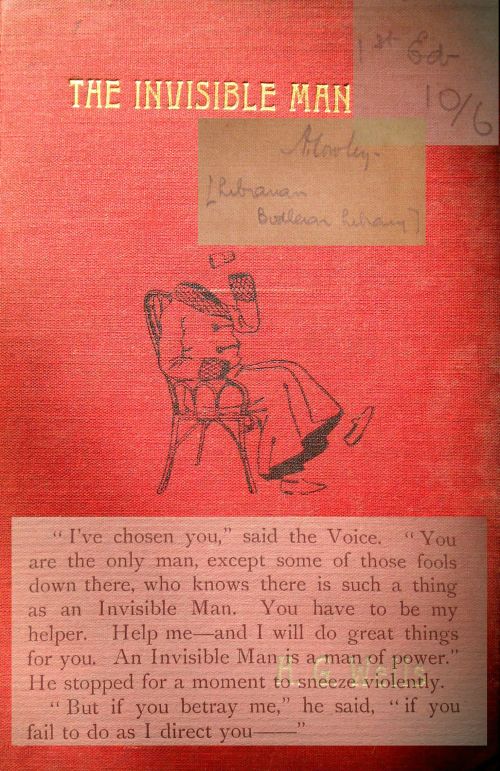
Cover, bookseller’s price, signature of A. Cowley and extract from p.75 of Alport’s copy of The Invisible Man : a grotesque romance by H.G. Wells. Pearson : London. 1897;
Transition Stories
The attempt to arrive at a complete denial of reality by way of a consistent and dogmatic exploration of the subconscious remains one of the important actions of our creative life. – Eugene Jolas (Preface to Transition Stories: twenty-three stories from ‘transition’, 1929)
This selection of stories from the early twentieth-century literary journal Transition looks to modern eyes like a 60s production rather than the 1920s artefact it is. This is partly thanks to the mechanical design printed on the boards, created by typographer Albert Schiller who combined pre-cast metal type elements to make his image.
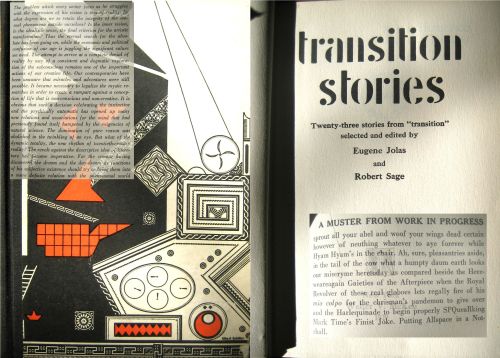
Extracts from the Preface and James Joyce’s ‘A Muster from Work in Process’, title page and front board design from Transition Stories : twenty-three stories from ‘transition’ selected and edited by Eugene Jolas and Robert Sage. Walter V. McKee : New York. 1929. Click on the image to read the texts on a larger version.
Transition’s editors published poetry, prose and artwork by contemporary avant-garde movements such as surrealists, Dadaists and modernists. The preface to Transition Stories explains their mission to reject bourgeois forms of literature including purely descriptive writing and challenge the domination of pure reason.
Among the writers published in Transition Stories are Gertrude Stein and Franz Kafka. Perhaps the most famous work to appear in the magazine was Finnegans Wake by James Joyce, which appeared in segments under the title ‘Work in Progress’.
Toborrow and toburrow and tobarrow! That’s our crass, hairy and evergrim life! We may come, touch and go, from atoms and ifs but we’re presurely destined to be odd’s without ends. – James Joyce (‘A Muster from Work in Progress’ in Transition Stories: twenty-three stories from ‘transition’, 1929)
Brave New World
But I don’t want comfort. I want God, I want poetry, I want real danger, I want freedom, I want goodness. I want sin. – the Savage (Brave New World, Aldous Huxley, 1932)
Aldous Huxley’s Brave New World questions the scientifically managed future societies of H.G. Well’s utopian novels. In Huxley’s dystopian world state human beings are given their social status before birth and conditioned from then on, by a mixture of drugs and nurture, to accept their place. The inhabitants of Huxley’s novel are content but when a ‘Savage’ is brought to London from his home on a New Mexican Reservation his outsider perspective reveals the incompatibility of individual freedom and a scientifically created trouble-free society.
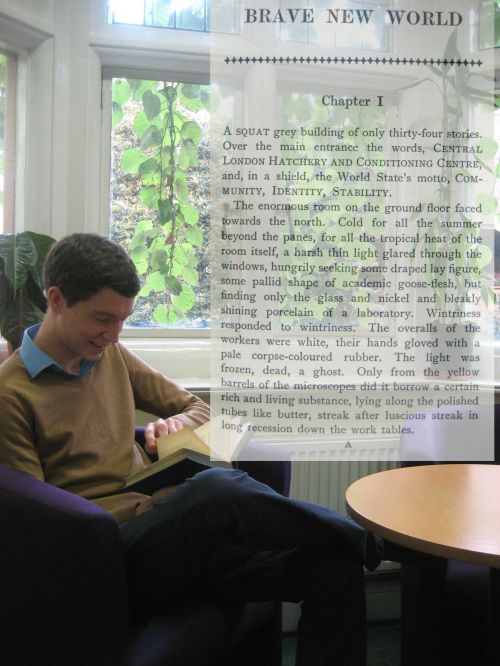
Chris from Univ’s Development Office going back to the future with Alport’s copy of Brave New World by Aldous Huxley. Chatto and Windus : London. 1932.
The Naked Lunch
The study of thinking machines teaches us more about the brain than we can learn by introspective methods. Western man is externalizing himself in the form of gadgets. Ever pop coke in the mainline? – Doctor Benway (The Naked Lunch, William Burroughs, 1959)
In his dedication to Howl and Other Poems Allen Ginsberg named William Burroughs as the author of Naked Lunch for the first time in print. He described Burroughs’ book as “an endless novel which will drive everybody mad”.
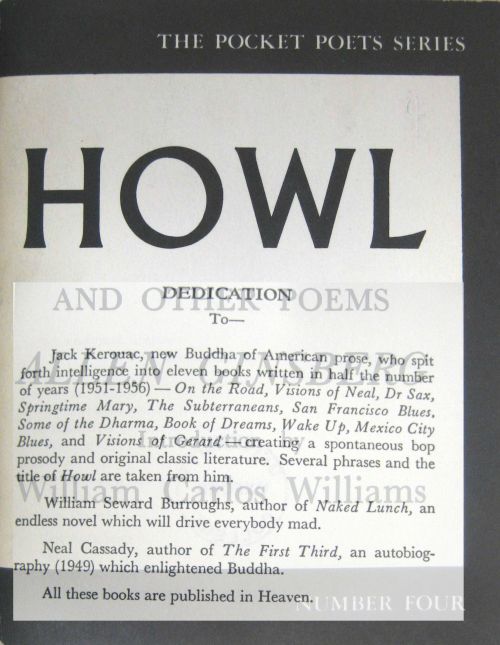
Cover and dedication from Howl and Other Poems by Allen Ginsberg. City Lights Books : San Francisco. 1956 (14th printing, 1965)
The ‘endless novel’ was a long time in gestation. It circulated in manuscript fragments between the author’s friends, correspondents, publishers and editors, and appeared in periodicals before finding a publisher. This communal writing process may have had some influence on the organic, mosaic nature of Burroughs prose which is picked up on by a contemporary review:
The literary notion of time as simultaneous, a montage, is not original with Burroughs; what is original is the scientific bent he gives it and a view of the world that combines biochemistry, anthropology, and politics. It is as though Finnegans Wake were cut loose from history and adapted for a cinerama circus titled “One World.” – Mary McCarthy (‘Déjeuner sur l’Herbe’ in The New York Review of Books, 1 February 1963)
Alport bought a copy of The Naked Lunch first published in 1959 in Paris by The Olympia Press. This edition has a cover designed by Burroughs himself and a ‘the’ in the title which Burroughs did not intend. Naked Lunch was controversial in both subject matter and language. Its American publisher, Grove, waited until 1962, and the favourable outcome of a court battle over the censorship of another of their authors, to publish it.
To celebrate the 50th anniversary of Naked Lunch Columbia University Libraries have created an online exhibition of their Burroughs collection which includes recordings of Burroughs reading from his novel.
The library has reading copies of some of the novels mentioned:
Brave New World by Aldous Huxley (YIO/HUX)
Finnegans Wake by James Joyce (YIK/JOY)
The Invisible Man by H.G. Wells (YIK/WEL)
Other sources used in this post were:
Ashley, Mike. Out of This World: science fiction but not as you know it. The British Library : London. 2011.
Birch, Dinah (Ed.). The Oxford Companion to English Literature. OUP : Oxford. 2009. (ZC)
Cloud, Gerald W. ‘Naked Lunch’ : the First Fifty Years. Online exhibition from Columbia University Butler Library, Rare Book & Manuscript Library. Accessed 16 Oct. 2012 <https://exhibitions.cul.columbia.edu/exhibits/show/nakedlunch>.
Tomlinson, Steven. “Cowley, Sir Arthur Ernest (1861–1931).” in Oxford Dictionary of National Biography. Online ed. Ed. Lawrence Goldman. OUP : Oxford. Accessed 16 Oct. 2012 <http://www.oxforddnb.com/view/article/32598>.
Wikipedia contributors. “The Invisible Man.” in Wikipedia, The Free Encyclopedia. Accessed 16 Oct. 2012 <http://en.wikipedia.org/wiki/The_Invisible_Man>
All images on this page are copyright of University College.

